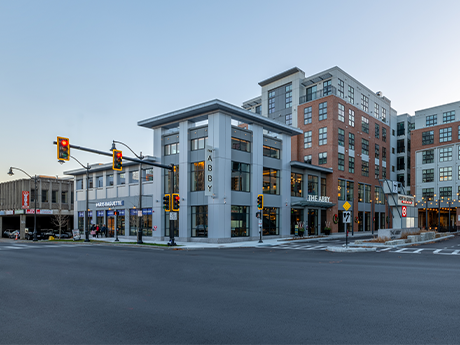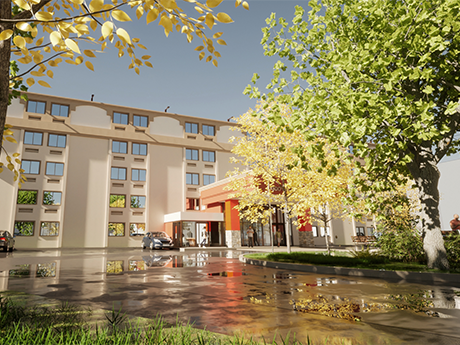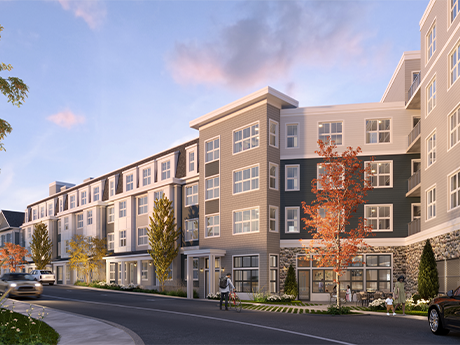Boston is a famously difficult place to build or buy new apartments. Developers often spend years searching for a suitable site and gaining approvals from municipalities prior to construction.
In the development boom that peaked in 2022, just on the heels of the coronavirus pandemic, developers started construction on hundreds of thousands of new apartments across the country — the largest amount of new construction in decades. In Boston, developers started tens of thousands of new apartments. It’s a lot of new construction, but it’s still less than Boston developers built in the building boom before the pandemic.
Boston is now one of the least-overbuilt apartment markets in the United States. That makes the market even more attractive to investors.
Today, high interest rates and high construction costs make building or buying an apartment property in Boston a Herculean challenge.
Patient apartment investors still line up to try. Some are holding sites, waiting for the right moment to start construction. Others are willing to pay high prices — even accepting negative leverage — to invest in Boston.
“Boston is one of the most compelling apartment investment markets in America,” says Matthew Gottesdiener, CEO of Northland, an apartment developer active across the U.S.
The firm spent 25 years assembling a 50-acre site and securing the right to build new apartments in its hometown of Newton, just west of Boston. Now Northland is waiting for the right time to seek construction financing.
Favorable Attributes for Investors
A strong local economy and the difficulty of building here are likely to make apartment properties in Boston attractive to investors for years to come.
Employers in metro Boston added 77,900 jobs over the 12-month period that ended in December 2023, a growth rate of 2.8 percent. By comparison, the national employment figure increased 1.9 percent, according to the U.S. Bureau of Labor Statistics.
“There is a great, talented workforce. People like to be in Boston — they like to live, work and play in Boston,” says Mike Henehan, president of Bozzuto Development Co. “We have been and will continue to be very interested in development opportunities in and around Boston.”

Strong Real Estate Fundamentals
Apartment rents are still growing in Boston. The average effective rent is expected to grow 2 percent in 2024 on a year-over-year basis to reach $2,974, according to Marcus & Millichap. That’s 22 percent higher than in 2019, the year preceding the pandemic.
That strong revenue growth over time has made Boston a great place to invest in apartments, according to Green Street Advisors. The Boston apartment market is now the strongest in the nation for both risk-adjusted returns to investors (close to 8 percent) and rent growth, according to Green Street.
Apartment investments in Boston currently generate the strongest internal rate of return (7 percent) of any of the other 50 largest apartment markets in the U.S., according to Green Street. Most other apartment markets show average internal rates of return around 7 to 7.5 percent, according to CBRE’s analysis of Green Street’s data.
In 2024, strong demand for apartments is likely to fill most of the thousands of new apartments recently finished.
“Boston renter demand has been very strong over the past year or so,” says Carl Whitaker, real estate economist at RealPage.
Developers are expected to finish 9,500 new apartments in the Boston metro area in 2023, according to Marcus & Millichap. That’s the largest number of new apartments in decades. But new renters are expected to absorb most — close to 8,000 — of those new units. The percentage of vacant apartments is expected to creep up only slightly by 40 basis points to reach 5.4 percent.
The number of new apartments opening in Boston will likely shrink in 2024, says Whitaker. “Construction is pulling back quickly today.”
Developers had 14,600 new apartments under construction in the Boston metro area as of December 2023, according to RealPage. That’s 15 percent less than the 17,225 new apartments under construction at the end of 2022 — the most active year for new construction since the pandemic.
“We don’t have a ton of near-term supply, so that obviously bodes well in the near term for good rent growth,” says Simon Butler, vice chairman and managing director for the Northeast and Mid-Atlantic for CBRE.
New multifamily apartment starts in Boston are down more than 30 percent in the past 12 months, according to RealPage. Developers cite continued headwinds from construction financing, says Whitaker, who expects construction activity to further decrease in the coming months.
New Apartments Fill up Quickly in Boston
In November 2023, when Bozzuto opened the third phase of The Abby, located south of Boston in Quincy, Massachusetts, eager renters leased 60 new apartments in 60 days. The apartment community is adjacent to a Massachusetts Bay Transportation Authority (MBTA) subway station.
“There’s a really strong demand in the Quincy market, especially for transit-oriented, well-executed projects,” says Bozzuto’s Henehan.
That same month, Bozzuto also completed the first apartments at the Rowen at the Pine Hills, a new community in Plymouth, Massachusetts, about 40 miles south of downtown Boston. Leasing activity at the Rowan is going well, even though lease-up began during the Christmas holidays in the middle of winter, says Henehan.
This March, Bozzuto also plans to start preleasing at Alder at Allston Yards, in Allston, Massachusetts, across the Charles River from Cambridge, Massachusetts. Strong renter demand is helping ensure all three of Bozzuto’s developments stay on track to meet budget projections, despite rising costs of development. “Revenue is performing well,” says Henehan.
Why Projects Aren’t Penciling Out
The growing cost of development has put pressure on apartment developers across the U.S. In Boston, these costs have stopped many apartment developers from breaking ground on new projects.
“The math doesn’t really work,” says CBRE’s Butler.
The cost of short-term, construction financing has more than tripled for many developers since March 2022, when officials at the Federal Reserve began to aggressively fight inflation by raising their federal funds rate 11 times from near zero to a target rate of 5.25 to 5.5 percent by late 2023.
In December 2023, the Federal Reserve indicated that it envisioned three rate cuts of 25 basis points each in 2024, provided that inflation continues to moderate. But no one expects interest rates to drop as low as they were in the decade before the pandemic, let alone near zero, according to industry experts.
“As interest rates have increased, construction capital has decreased,” says Larry Curtis, president and managing partner of Winn Development, a leading developer of affordable, mixed-income and market-rate apartments in the Boston metro area.
Construction lenders base the size of the loans they make on how much debt they believe a property can support. For every percentage point that interest rates rise, banks typically shrink the size of loans they are willing to make to developments by 10 percent, says Curtis.
Other costs have also strained development budgets. Construction costs increased 10 percent or more in Boston in the past year, says Curtis.
“Inflation in construction costs has moderated but not gone away,” says Andy Waxman, regional vice president of real estate development for The Community Builders (TCB). The cost of labor may also ease in 2024 as the number of apartments under construction continues to shrink.
“There are talented, skilled workers on the sidelines right now, waiting for financially viable developments to put them to work,” says Curtis. Operating costs, like the price of property insurance, have also grown quickly.
“Insurance costs are really hard to forecast. They can change with a major weather event,” says Bozzuto’s Henehan. “The cost has certainly been a great increase over previous budget expectations.”
Developers Wait to Start Construction
When Bozzuto delivers the three projects it currently has underway, it will have nothing under construction in Boston for the first time since the developer entered the market in 2017.
Bozzuto has gained the necessary municipal approvals to undertake another phase of new apartments at its Alder development in Allston, but it has no plans to take out a construction loan and start building there or anywhere else in the metro area in 2024.
“We have zoning in place. We are in good shape to proceed at the appropriate time, but we haven’t actively been working on it,” says Henehan. “We are really focused on executing the projects that have opened recently or are about to deliver.”
What is Bozzuto waiting for? “There’s going to have to be some more certainty on the interest rate side,” says Henehan. “There also needs to be some more consistency with construction pricing.”

Northland Starts Construction with No Loan
Northland plans to finally seek construction financing in 2024 or 2025 for the first 140 new apartments at its giant redevelopment on Needham Street in Newton, Massachusetts.
In March 2020, Northland obtained permits to build 800 new apartments on 23 acres of a sprawling, 50-acre site. Northland’s site is now filled with warehouses, strip malls, parking lots and a historic mill building that had been renovated to office space.
To earn the right to build, Northland had to gain support from two-thirds of the Newton City Council and also win a citywide referendum voted on by the citizens of Newton.
Since then, Northland spent $50 million of its own capital on construction work at the site.
“We’re advancing the project,” says Northland’s Gottesdiener. “We’re now confronting rapidly escalating hard construction costs and a complicated financing market.”
Northland has access to equity capital from patient investors and typically holds properties it develops for many years. It can afford to wait to seek construction financing.
In fall 2023, Northland had a round of conversations with potential construction lenders. The firm received formal quotes from five money center banks in addition to debt funds.
“We first introduced lenders to the project in 2022. We give them updates on our work,” says Gottesdiener. In 2023, that work included winning the right to someday build even more new apartments on another part of the 50-acre site. Northland won a permit to create another 350 new apartments.
Challenges Don’t Stop Affordable Developers
Not all developers are waiting to start construction in Boston. In January 2024, TCB acquired a former Comfort Inn hotel in the Dorchester neighborhood of Boston.
“We’re converting it into permanent supportive housing for folks coming out of homelessness,” says TCB’s Waxman.
The affordable housing developer will use a combination of state and federal funds to redevelop the former hotel in partnership with Pine Street Inn, a leading operator of supportive housing, says Waxman.
Affordable housing developers face many of the same challenges that conventional apartment developers now struggle with, including high construction costs, high interest rates and high operating costs like property insurance.
Affordable developers have been able to make projects work with a little extra help from state and federal affordable housing programs. Extra subsidy dollars have helped fill holes in many development budgets — but there is only so much money to go around.
State lawmakers are now considering providing additional support. In October 2023, Massachusetts Gov. Maura Healey proposed the $4 billion Affordable Homes Act, intended to help finance the production of more than 40,000 new affordable homes and to preserve thousands more.
“How much subsidy there will be going forward has a huge impact on the speed with which we move projects,” says Waxman.
Local officials are also figuring out how to comply with the MBTA Communities law. The 2021 law requires towns to let developers build new apartments around commuter rail stations, subway stations, ferry terminals or bus stations run by the Massachusetts Bay Transportation Authority (MBTA).
MBTA Communities should help fill the gap left behind by Massachusetts’s Chapter 40B comprehensive zoning statute. For decades, developers could use Chapter 40B to force towns to accept new mixed-income development if the town had not yet met a certain minimum amount of affordable housing.
“Chapter 40B is kind of played out,” says CBRE’s Butler. “Most of our municipalities have hit the thresholds they need to hit.”
For example, Northland used Chapter 40B in 2023 to win a permit to build another 350 apartments in Newton. The town has now fulfilled the requirements set by the statute. “If I had a new site today, 40B would not be an avenue” to get a building permit in Newton, says Gottesdiener.
Even though many towns have met the tiny targets set by 40B, Boston is still one of the most expensive, least-affordable housing markets in the U.S.
Housing advocates, lawmakers and local zoning officials in Massachusetts have been arguing over statutes like Chapter 40B and the MBTA Communities law for decades now. The discussion among housing advocates is now largely centered around constructive policies that lower development barriers, says Curtis of Winn Development.
Advocates for rent control laws recently failed to get rent control on the ballot for the November 2024 election. They needed to gather nearly 75,000 signatures. But they only found about 10,000 people willing to sign their petitions.
“People are suffering in these market conditions, and it’s natural to want to help them, but fixing rents doesn’t fix the cost of land or construction,” says Curtis, “and it certainly doesn’t fix the supply problem.”
— By Bendix Anderson. This article originally appeared in the Jan/Feb issue of Northeast Multifamily & Affordable Housing Business.


